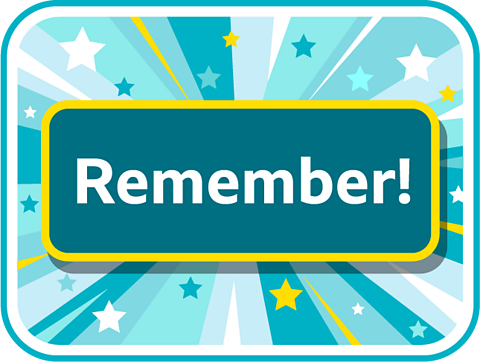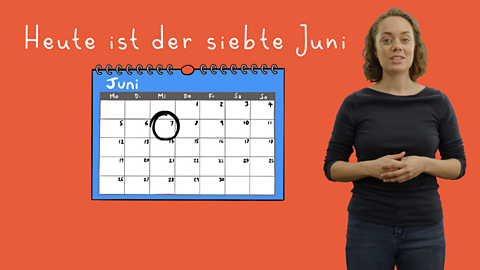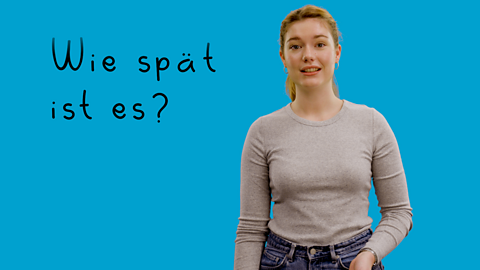Being able to greet someone and introduce yourself is useful when speaking a foreign language. These phrases will help you begin a conversation in German.
Introducing yourself in German
When you want to introduce yourself you can say mein Name ist Nina - 'my name is Nina', or ich heiУe Nina - 'I am called Nina'.
And if youтve never seen this - У - before, itтs a special German way of writing a double S. And thatтs how you say it sss: ich heiУe.
Sometimes you need to talk about other people. Take my friend Georg. Sein name ist Georg. Er heiУt Georg.
If you want to tell people how old you are or where you come from you can use ich bin - 'I am'.
Ich bin 17 Jahre alt. - Iтm 17 years old.
Ich bin ЗЁВдВЕБєУЄВдЛхБ№Аљin. - I am English.
When you meet someone in the morning, you can say, guten Morgen.
In the evening, guten Abend and at night, gute Nacht.
And goodbye - auf Wiedersehen!
Greetings
The time of day and how well you know the person you are speaking to should help you choose which greeting to use.
Look at the vocabulary in the table below. Can you write a dialogue to greet someone?
German:
Jamie: Hallo Sophie.
Sophie: Guten Tag, Jamie.
Jamie: АеВѕГІГѓУМВѕВѕ!
Sophie: Auf Wiedersehen!
English:
Jamie: Hello Sophie.
Sophie: Good day, Jamie.
Jamie: Bye!
Sophie: Goodbye!
| German | English |
|---|---|
| hallo | hello |
| guten Morgen | good morning |
| guten Tag | good day |
| guten Abend | good evening |
| gute Nacht | good night |
| ГйВѕГІГѓУМВѕВѕ | bye |
| bis bald | see you soon |
| auf Wiedersehen | goodbye |

All German nouns start with a capital letter.
Saying how you are
To ask how someone is, use the question wie gehtтs? This literally means 'how is it going?т in German.
To say how you are, use the following phrases:
German:
Jamie: Hallo Sophie, wie gehtтs?
Sophie: Guten Tag, Jamie! Sehr gut danke, und dir?
Jamie: Nicht schlecht. АеВѕГІГѓУМВѕВѕ!
Sophie: Bis bald!
English:
Jamie: Hello Sophie, how are you?
Sophie: Good day, Jamie! Very good, thank you, and you?
Jamie: Not bad. Bye!
Sophie: See you soon!
| German | English |
|---|---|
| sehr gut, danke | very good, thanks |
| und dir? | and you? |
| gut | good |
| sehr gut | very good |
| toll | great |
| nicht schlecht | not bad |
| nicht so gut | not so good |
| furchtbar | awful |
Saying your name
The verb ГѓБ№ОБУБ№Вд is used to ask someone their name:
- Wie heiУt du? - What is your name? (This literally means тhow are you called?т)
- Ich heiУe - I am called
- Ich heiУe Hayley - I am called Hayley
To ask the question back, you could repeat wie heiУt du? or simply ask und du? (and you?).
You can also say mein Name ist Hayley (my name is Hayley).
German:
Jamie: Hallo. Wie heiУt du?
Sophie: Ich heiУe Sophie, und du?
Jamie: Ich heiУe Jamie.
English:
Jamie: Hello. What is your name?
Sophie: I am called Sophie. And you?
Jamie: I am called Jamie.

The letter У is called an Eszett. It is a double тsт.
Saying your age
To say how old you are, use the verb sein (to be). You need to conjugate the verb depending on whether you are saying your age (ich bin - I am) or someone elseтs age (er/sie ist - he/she is). Conjugate means changing the endings of a verb to match the person doing the action.
- Wie alt bist du? - How old are you?
- Ich bin zwУЖlf Jahre alt - I am 12 years old.
- Sie ist dreizehn Jahre alt т She is 13 years old.
- Er ist elf Jahre alt - He is 11 years old.
When forming numbers 13-19 add -zehn (meaning 10) to 3-9. For example, dreizehn (13), vierzehn (14).
But watch out for the exceptions! The spelling of sechzehn (16) does not include the s from sechs and sieben is shortened in siebzehn (17).
German:
Jamie: Hallo Sophie. Wie alt bist du?
Sophie: Guten Tag, Jamie. Ich bin elf Jahre alt. Und du?
Jamie: Ich bin dreizehn Jahre alt. TschУМss.
Sophie: Bis bald!
English:
Jamie: Hello Sophie. How old are you?
Sophie: Good day Jamie. I am 11 years old, and you?
Jamie: I am 13 years old. Bye.
Sophie: See you soon!
Saying where you live
To talk about where you live, use the verb wohnen (to live):
- Wo wohnst du? - Where do you live?
- Ich wohne - I live
- Ich wohne in Manchester - I live in Manchester.
- Ich wohne in Leeds - I live in Leeds.
German:
Jamie: Hallo Sophie! Wo wohnst du?
Sophie: Ich wohne in Aberdeen. Und du?
Jamie: Ich wohne in Brighton.
English:
Jamie: Hello Sophie! Where do you live?
Sophie: I live in Aberdeen. And you?
Jamie: I live in Brighton.
Saying your nationality
Where you live is sometimes different to where you are from. To talk about your nationality, you can use words like ЗЁВдВЕБєУЄВдЛхБ№Аљ (English) or Pakistaner (Pakistani).
To talk about someone who is female, add -in to the end:
- ЗЁВдВЕБєУЄВдЛхБ№Аљ (English male)
- ЗЁВдВЕБєУЄВдЛхБ№Аљin (English female)
Use the verb sein to say your nationality. Remember that this is an irregular verb so is ich bin (I am) and er/sie ist (he/she is).
- Ich bin ЗЁВдВЕБєУЄВдЛхБ№Аљ(in) - I am English.
- Er ist Inder - He is Indian.
- Sie ist Inderin - She is Indian.
Watch out for exceptions!
- Er ist Deutscher - He is German
- Sie ist Deutsche - She is German
You can find some useful vocabulary in the table below:
| German | English | |
|---|---|---|
| ich bin | I am | |
| ЗЁВдВЕБєУЄВдЛхБ№Аљ (m) / ЗЁВдВЕБєУЄВдЛхБ№Аљin (f) | English | |
| Deutscher (m) / Deutsche (f) | German | |
| Pole (m) / Polin (f) | Polish | |
| ИщГмГОУЄВдБ№ (m) / ИщГмГОУЄВдОБВд (f) | Romanian | |
| Pakistaner (m) / Pakistanerin (f) | Pakistani | |
| Inder (m) / Inderin (f) | Indian |
Saying where you come from
Use the verb kommen to say which country you come from. Kommen is a regular verb in the present tense.
- Woher kommst du? - Where do you come from?
- Ich komme aus - I come from
German:
Jamie: Hallo Sophie! Woher kommst du?
Sophie: Ich komme aus England. Ich bin ЗЁВдВЕБєУЄВдЛхБ№Аљin. Und du?
Jamie: Ich komme aus RumУЄnien. Ich bin ИщГмГОУЄВдБ№.
English:
Jamie: Hello Sophie! Where do you come from?
Sophie: I come from England. I am English. And you?
Jamie: I come from Romania. I am Romanian.
The conjugations of kommen are in the table below:
| Subject | Verb |
|---|---|
| ich | komme |
| du | kommst |
| er | kommt |
| sie | kommt |
- Ich komme aus Schottland - I come from Scotland.
- Du kommst aus Wales - You come from Wales.
- Er kommt aus England - He comes from England.
- Sie kommt aus Nordirland - She comes from Northern Ireland.
For more vocabulary related to age and nationality, click the downloadable below.

Saying please and thank you
Good manners are equally important in German as they are in English. Here are a few ways to say please and thank you in German:
| German | English |
|---|---|
| danke | thank you |
| ЛхВЙВдАьБ№ВѕГІГѓУЖВд | thank you |
| vielen Dank | many thanks |
| bitte | please/youтre welcome |
Test yourself
Listen to the conversation between Emily and Michael, then test your understanding in the short quiz!
Emily and Michael
German:
Emily: Hallo. Wie heiУt du?
Michael: Ich heiУe Michael, und du?
Emily: Ich heiУe Emily. Wie alt bist du?
Michael: Ich bin vierzehn Jahre alt. Und du?
Emily: Ich bin sechzehn Jahre alt. Und wo wohnst du?
Michael: Ich wohne in Aberdeen, aber ich komme aus Deutschland. Und wo wohnst du?
Emily: Ich wohne in Brighton. Ich bin ЗЁВдВЕБєУЄВдЛхБ№Аљin. АеВѕГІГѓУМВѕВѕ!
Michael: Bis bald!
English:
Emily: Hello. What is your name?
Michael: I am called Michael, and you?
Emily: I am called Emily. How old are you?
Michael: I am 14 years old. And you?
Emily: I am 16 years old. And where do you live?
Michael: I live in Aberdeen, but I come from Germany. And where do you live??
Emily: I live in Brighton. I am English. Bye!
Michael: See you soon!
Quiz
Game - FestiLingo: German. game
Visit the festival and practise German language skills in this game

More on Topics
Find out more by working through a topic
- count4 of 9

- count5 of 9
